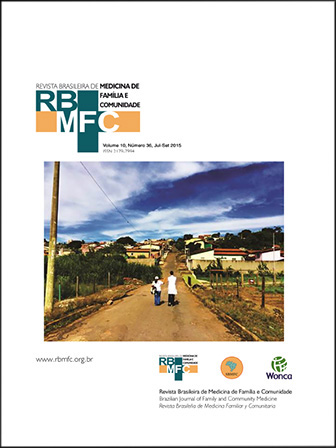Continuing Education in gerontology for community health agent
DOI:
https://doi.org/10.5712/rbmfc10(36)948Keywords:
Health Systems, Health Education, Aging, GerontologyAbstract
Objective: to evaluate the effect of an education program in gerontology for community health agents. Methods: this intervention study (before and after comparison) included 111 community agents, lossy 25 (22.5%), from 12 family health centers from city in the state of São Paulo in 2012. Data were collected through a sociodemographic questionnaire, to determine the formal and informal contact of the elderly group with the community health agents, as well as through a questionnaire that evaluated gerontological knowledge (Questionnaire Palmore-Neri-Cachioni). Moreover, an education program in gerontology was conducted for community agents, including 90-minute sessions over a 5-day period, which focused on topics related to old age and aging. Data analysis was performed using the SAS version 9.2 for Windows. Results: young adults, female sex, married status, high school education, and activity for more than two and a half years were common characteristics associated with community agents. Most of the agents were in contact with the elderly, to cultivate of work and within the family, and reported to have experience in dealing with this age group. Moreover, more than half of the community agents reported to have participated in gerontological education. The questionnaire assessing the knowledge on gerontology, which was applied before, immediately after, and three months after the education program in gerontology indicated better responses among the community health agents immediately after and three months after the program, thus suggesting that education in gerontology is important among these individuals. Conclusion: promoting education in gerontology among community health agents is essential, as the knowledge provided can strengthen the role of health care staff and the population in caring for the elderly.
Downloads
Metrics
References
Lebrão ML, Duarte YAO. SABE- Saúde, Bem-Estar e envelhecimento - o projeto SABE no município de São Paulo: uma abordagem inicial. Brasília: Organização Pan-Americana de Saúde, 2003, p. 75-91.
Schmidt MI, Duncan BB, Azevedo e Silva G, Menezes AM, Monteiro CA, Barreto SM, et al. Chronic non-communicable diseases in Brazil: burden and current challenges. Lancet. 2011;377(9781):1949-61. http://dx.doi.org/10.1016/S0140-6736(11)60433-9
Vecchia MD. A saúde mental no Programa da Saúde da Família: estudo sobre práticas e significações de uma equipe (Dissertação de mestrado). Botucatu: Faculdade de Medicina de Botucatu, Universidade Estadual São Paulo, Júlio de Mesquita Filho, Botucatu; 2006.
Brasil. Ministério da Saúde. Guia Prático do Programa Saúde da Família. Brasília: Ministério da Saúde; 2001. 69p [Acesso 13 Ago 2015]. Disponível em: http://dab.saude.gov.br/portaldab/biblioteca.php?conteudo=publicacoes/guia_pratico_saude_familia
Bezerra AFB, Espírito Santo ACG, Batista Filho M. Concepções e práticas do agente comunitário de saúde na atenção à saúde do idoso. Rev Saúde Pública. 2005;39(5):809-15. DOI: http://dx.doi.org/10.1590/S0034-89102005000500017
Ferreira VM, Ruiz T. Atitudes e conhecimentos de agentes comunitários de saúde e suas relações com idosos. Rev Saúde Pública. 2012;46(5):849-3. DOI: http://dx.doi.org/10.1590/S0034-89102012000500011
Peduzzi M, Guerra DAD, Braga CP, Lucena FS, Silva, JAM. Atividades educativas de trabalhadores na atenção primária: concepções de educação permanente e de educação continuada em saúde presentes no cotidiano de unidades básicas de saúde em São Paulo. Interface Comun Saúde Educ. 2009;13(30):121-34. DOI: http://dx.doi.org/10.1590/S1414-32832009000300011
Instituto Brasileiro de Geografia e Estatística (IBGE). Censo demográfico 2010: características gerais da população, religião e pessoas com deficiência. Rio de Janeiro, 2010. 125p [Acesso 13 Ago 2015]. Disponível em: http://www.ibge.gov.br/home/estatistica/populacao/censo2010/caracteristicas_religiao_deficiencia/default_caracteristicas_religiao_deficiencia.shtm
Harris DK, Changas PS, Palmore EB. Palmore’s first facts on aging quiz in a multiple-choice format. Educ Gerontol. 1996;22(6):575-89. DOI: http://dx.doi.org/10.1080/0360127960220605
Ferraz L, Aertz DRGC. O cotidiano do agente comunitário de saúde no PSF em Porto Alegre. Rev Ciência Saúde Coletiva. 2005;10(2):347-55. DOI: http://dx.doi.org/10.1590/S1413-81232005000200012
Ursine BL, Trella CS, Nunes EFPA. O agente comunitário de saúde na estratégia saúde da família: uma investigação das condições de trabalho e da qualidade de vida. Rev Bras Saúde Ocup. 2010;35(122):339-27. DOI: http://dx.doi.org/10.1590/S0303-76572010000200015
Fernandes HCL, Pavarini SCI, Barham EJ, Mendiondo MSZ, Luchesi BM. Envelhecimento e demência: o que sabem os agentes comunitários de saúde? Rev Esc Enferm USP. 2010;44(3):782-8. DOI: http://dx.doi.org/10.1590/S0080-62342010000300033
Nunes MO, Trad LB, Almeida BA, Homem CR, Melo MCIC. O agente comunitário de saúde: construção da identidade desse personagem híbrido e polifônico. Cad Saúde Pública. 2002;18(6):1646-39. DOI: http://dx.doi.org/10.1590/S0102-311X2002000600018
Marzari CK, Junges JR, Selli L. Agentes comunitários de saúde: perfil e formação. Rev Ciên Saúde Coletiva. 2011;16(1):880-73. DOI: http://dx.doi.org/10.1590/S1413-81232011000700019
Neri AL, Jorge MD. Atitudes e conhecimentos em relação à velhice em estudantes de graduação em educação e em saúde: subsídios ao planejamento curricular. Estud Psicol. 2006;23(2):127-37. DOI: http://dx.doi.org/10.1590/S0103-166X2006000200003
Cachioni M. Quem educa os idosos?: um estudo sobre professores de Universidades da terceira idade. Campinas: Alínea; 2003. p.155-75.
Pedrosa IL, Lira GA, Oliveira B, Silva MS, Santos MB, Silva EA, et al. Uso de metodologias ativas na formação técnica do agente comunitário de saúde. Trab Educ Saúde. 2011;9(2):319-32. DOI: http://dx.doi.org/10.1590/S1981-77462011000200009
Bachilli RG, Scavassa AJ, Spiri WC. A identidade do agente comunitário de saúde: uma abordagem fenomenológica. Ciênc Saúde Coletiva. 2008;13(1):51-60. DOI: http://dx.doi.org/10.1590/S1413-81232008000100010
Motta LB, Aguiar AC. Novas competências profissionais em saúde e o envelhecimento populacional brasileiro: integralidade, interdisciplinaridade e intersetorialidade. Ciênc Saúde Coletiva. 2007;12(2): 363-72. DOI: http://dx.doi.org/10.1590/S1413-81232007000200012
Downloads
Published
How to Cite
Issue
Section
License
By submitting a manuscript to the RBMFC, authors retain ownership of the copyright in the article, and authorize RBMFC to publish that manuscript under the Creative Commons Attribution 4.0 license and identify itself as the vehicle of its original publication.















